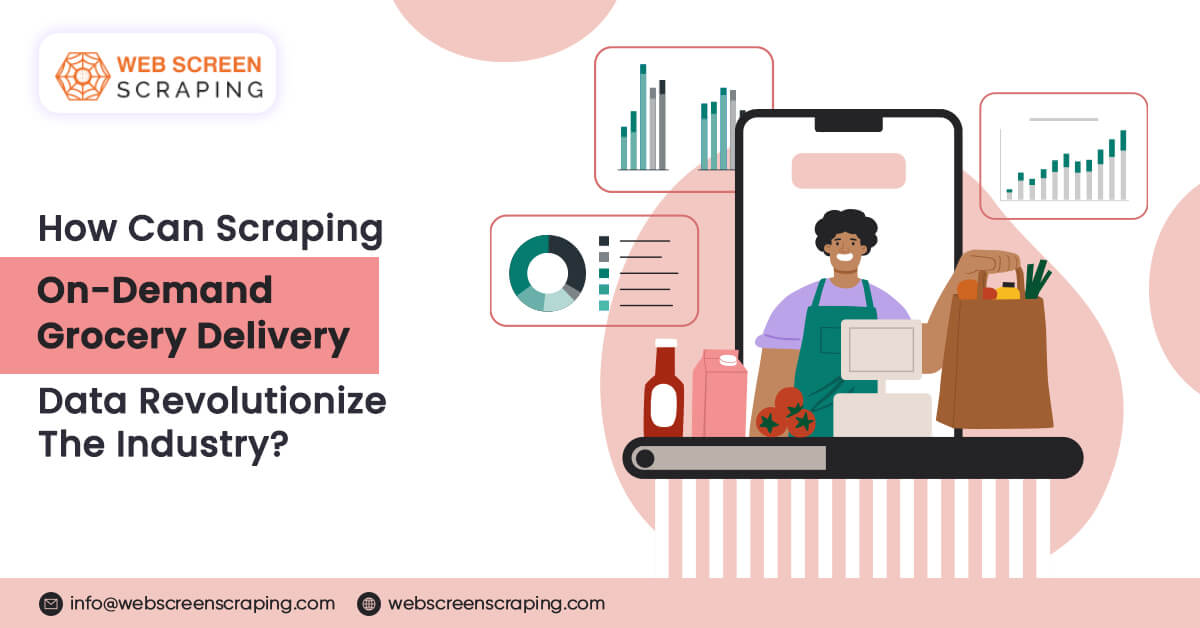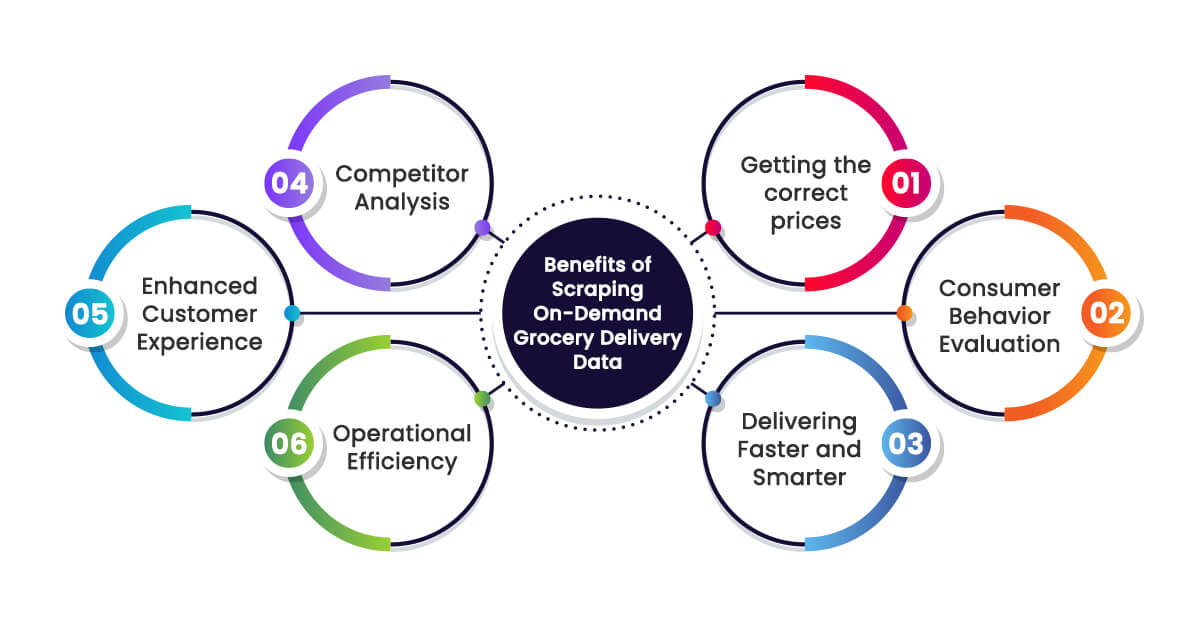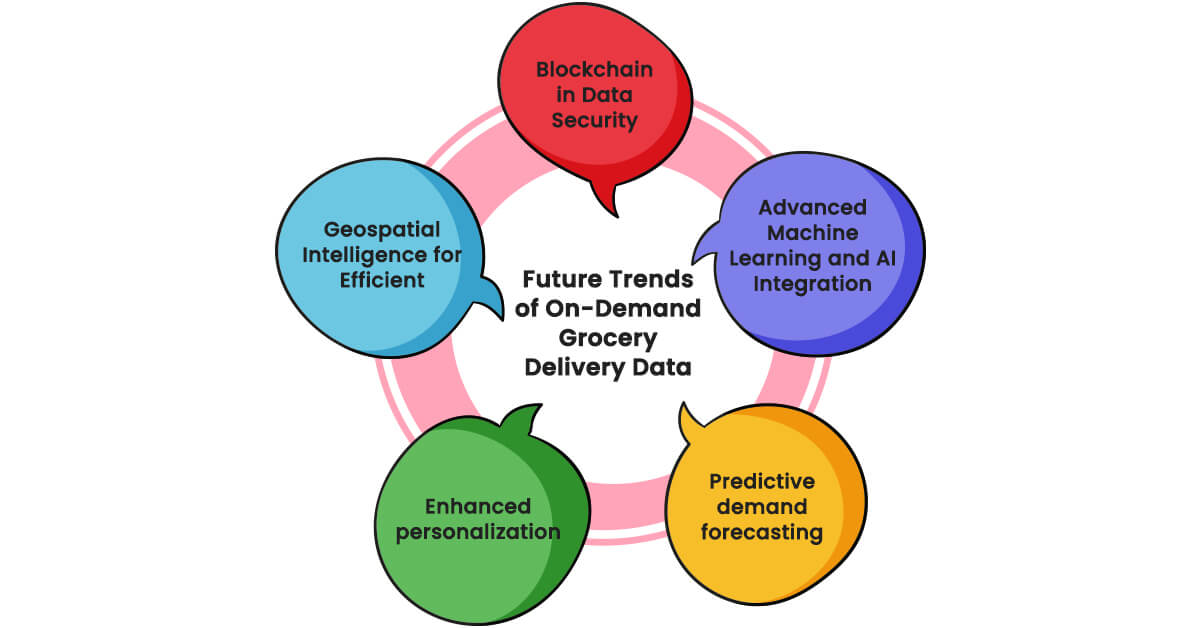
In recent years, technology has greatly changed how we get groceries delivered to our doorstep. Businesses using web scraping can learn a lot about how people shop for groceries online. This information helps them make intelligent choices, customize their services to people's wants, and make customers happier. Imagine your grocery delivery. The app predicts your needs before you know them. When you use grocery delivery apps, it can help you. A bundle of data is being compiled in the background. That's the power of data scraping.
The ease and accessibility of online grocery delivery solutions have changed how individuals buy groceries. This eliminates the requirement for journeys to nearby stores. This business is flourishing, with an expected 20% annual revenue increase between 2021 to 2031. Orders on well-known websites like Amazon Fresh, InstaCart and DoorDash are rising significantly. However, collecting data on on-demand grocery delivery has led to the emergence of other data-scraping businesses.
What is On-Demand Grocery Data?
Grocery delivery app data scraping means all the information gathered from how on-demand grocery delivery services work. These services have transformed the buying behavior of customers and deliver them quickly to their door. The data includes different parts of the process, like what customers order, how much, where it's going, and when they want it delivered. This data is essential to make sure orders are correct and delivered on time. So, looking at on-demand grocery delivery app data scraping helps understand how people shop for groceries.
By collecting information from grocery data, businesses can see what customers are doing, keep an eye on product prices, and know about different products and special deals. This helps businesses run more smoothly daily, make smarter decisions, stay aware of prices, and give them an advantage over others.
What is the Significance of Scraping On-Demand Grocery Delivery Data?
Businesses scrape on-demand grocery delivery data as a significant boost to the industry. It is a tool that makes everything work smoother and more innovative. When businesses scrape data, they get the most up-to-date and accurate information. For example, they can know current prices, available products, and customers' preferences.
This is crucial since the grocery segment is undergoing rapid change. Scraping grocery data enables businesses to change and swiftly become incredibly efficient. They can keep ahead of the game by regularly monitoring what their competitors are doing, giving them a significant advantage over other firms. This helps not just enterprises but also customers. Companies may use scraped data to guarantee that our groceries come faster, at better prices, and with a more personalized shopping experience.
Businesses are able to make well-informed decisions by extracting grocery data because they have detailed knowledge of the market. Imagine knowing which store has the best prices or always has your favorite products in stock. Scraping helps companies figure this out. They can adjust their prices in real time to stay competitive and offer us the best discounts.
Grocery delivery app data scraping helps firms identify what their consumers like. They may learn about our tastes by reading our reviews, ratings, and comments. This implies companies may modify their goods to meet our preferences, making our purchasing experience more personalized. It acts as a virtual shopping assistant that understands just what you prefer.
Benefits of Scraping On-Demand Grocery Delivery Data

Businesses are able to scrape grocery delivery app data that offers several benefits to firms in this ever-changing market. Gathering and evaluating data from these services provides several opportunities for improvement.
Getting the correct prices
Assume you're in a race and want to ensure you're running at the same pace as everyone else. At the store, they aim to ensure the pricing is competitive with other stores. It works similarly to a speedometer for our prices by providing real-time information on other retailers' charges. If we observe competitors moving quicker (charging less), we might accelerate (reducing our rates) to stay in the race.
Consumer Behavior Evaluation
Businesses can learn a lot from customer reviews and ratings. They can gather this information in real-time and adjust their offerings to meet customer needs and expectations better. Scraping grocery delivery app data helps make customers happier and more loyal.
Delivering Faster and Smarter
We want to find the fastest way to the park and the most efficient way to deliver groceries. Finding efficient and fast delivery methods is like finding the quickest paths to the park. This saves fuel and time. It also helps the environment and makes delivery faster.
Competitor Analysis
In our store, we want to know what other stores are doing so we can make the right moves, too. Watching what other stores are doing helps to understand the actions of competitors. If we see something new or changing in the grocery market, we can make intelligent decisions and stay ahead of the competition.
Enhanced Customer Experience
Imagine having all your favorite snacks whenever you want. We want our store to have what our customers want so they are happy. We always offer what customers want, just like having a snack cabinet full of all your favorites. Customers like shopping with us, and we deliver their items as quickly as possible to make them even happier.
Operational Efficiency
Nowadays, we want the computer to assist us with our shop operations. Imagine having a robot companion who assists you with your duties. Similarly, we want the computer to assist us with our shop operations.
Future Trends of On-Demand Grocery Delivery Data

AI, machine learning, blockchain, and regular grocery data scraping can give us more detailed information. We can use this information to ensure we collect data fairly and sustainably from grocery delivery and grocery apps.
Advanced Machine Learning and AI Integration:
Organizations can enhance the processing of on-demand grocery delivery data scraping using advanced machine learning and AI. This improves automation and sophistication. It also offers valuable insights and predictive analytics to help with decision-making.
Predictive demand forecasting
Businesses can use historical and also real-time information to predict future demand. This improves management of inventory and helps forecast high-demand periods. It also ensures enough resources to meet consumer expectations.
Enhanced personalization
Using scraped data to provide highly tailored suggestions and experiences to each consumer. Tailoring on-demand delivery services to unique interests and habits will help boost consumer loyalty and happiness.
Geospatial Intelligence for Efficient Delivery
Businesses use location information, such as maps and real-time data, to help drivers find the best and fastest routes. This is similar to how your GPS guides you to the quickest way to a friend's house. Businesses use this location data to plan to improve delivery routes in real-time.
Blockchain in Data Security
Using blockchain technology can improve the security of the information we gather. As concerns about data security rise, blockchain emerges as a highly secure and trustworthy solution. It protects the acquired data from manipulation and guarantees accuracy and reliability.
Conclusion
Web scraping can have a big impact on the fast-changing, on-demand grocery delivery industry. It lets businesses get the most current information to make smart decisions and improve their operations. This technology also helps businesses to stay updated about their competition. The industry depends on data. Grocery data scraping will change how we shop for essential items. Web Screen Scraping assists in making the experience smoother and more personalized approach to scrape grocery delivery app data. Grocery delivery services can use data to create a personalized and efficient shopping experience. They are leaders in the digital changes happening in retail.

